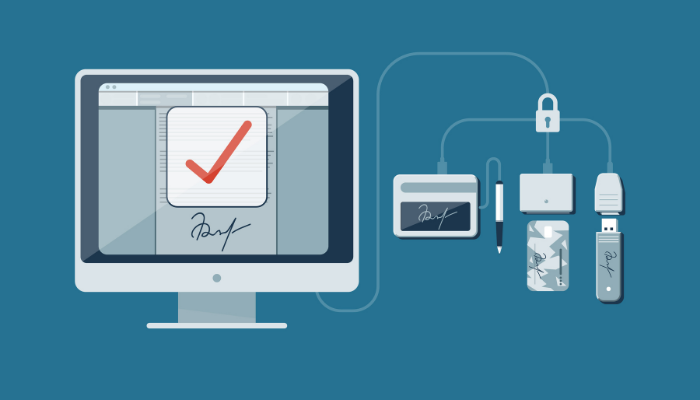There has been a significant increase in the number of human resources professionals using e-signatures in the last 8-10 months. This incredible surge can be primarily due to the pandemic and how it has changed the world of work. Businesses all over the world are either moving to a distributed workforce or remote teams. With electronic signatures, the job of HR becomes a little easier in these testing times.
There is a common misconception according to which digital signatures and e-signatures are one and the same thing. Both these are fundamentally different from each other. While a digital signature is a way to ensure the authenticity of a document, an electronic signature is a way to seek agreement or approval from a person.
To begin with, it is important to understand what e-signatures actually are. In simple terms, they are an alternative to the manual signatures that have been used for centuries. They allow HR teams to get employee approval and consent on e-forms and e-documents. Keeping COVID concerns in mind, HR has moved to a much safer and more time-saving way of getting employees’ signatures on documents that are related to remote hiring and onboarding as well as work-from-home contracts amongst other things.
You might also be interested to read: 4 HR Compliance Strategies That Can Boost Productivity
The pandemic and the lockdowns and closures that were imposed throughout the world to reduce its spread have made HR professionals look at the feasibility of using electronic signatures in a completely different light. With no access to courier services as well as office equipment, such as printers and scanners amongst others, HR professionals had to look out for an alternative that can help them not only during the pandemic but also in the future. Electronic signatures provide HR with a touchless documentation process that is more effective and efficient than its traditional handwritten counterpart.
One of the best things about e-signatures is that it can be used by professionals to sign forms and documents from not only their computers but also their phones and tablets. Apart from helping HR deal with the health concerns due to the pandemic, electronic signatures also allowed them to switch to a paperless mode of documentation. Paperless HR workflow also leads to a better candidate experience during hiring and onboarding.
The growing adoption of e-signatures by HR has proven to be instrumental in helping them negotiate the complexities associated with remote hiring and onboarding in the current situation. This rise in popularity has been more than anyone would have ever anticipated. However, there are a few things that HR professionals can ensure to improve their remote document processes even further.
There are electronic signature solutions available in the market that can be integrated with the existing HRMS solutions. Employees are required to sign documents on a regular basis after their hiring. Some of these documents include payroll, reimbursements, performance reviews, claims, and timesheets amongst others. Asking employees to get these documents printed and sign them physically when they are working remotely can lead to low productivity and engagement amongst other things. This is why e-signatures are an ideal alternative to physical signatures. They can save remote employees a lot of time and effort.
There are several benefits of electronic signatures, some of which have been briefly touched upon earlier. Here are a few more benefits:
Accelerate hiring and onboarding
Many companies put a lot of time and effort into getting candidate signatures on several documents. This can put these candidates in an uncertain state of mind. This is where companies that have an advanced hiring and onboarding process in place can provide the answers to the questions that these candidates have in mind. Wastage of time in getting signatures can be detrimental to any recruitment effort. The speed to hire takes a significant hit due to delaying signatures. E-signatures are the solution to this problem.
When human resources professionals are slogging it out using traditional methods of printing documents and getting physical signatures, others in the field that are more open to adopting modern methods are turning to a progressive, less time-consuming way of getting this job done. Electronic signatures help HR to digitize documentation, automate daily tasks, and transform the way they hire new talent.
Track document status in real-time
Awaiting manually signed documents can be quite annoying. The issues associated with physical signatures on printed documents include the uncertainty of whether or not a candidate received all the documents, whether they signed in all the right places or not, and others. There are several e-signature solutions that help HR professionals to track the status of different documents in real-time. So they can use these solutions to find out whether documents have been sent or not, whether they have been signed or not, and whether they have been uploaded back on the system or not.
Work from anywhere
Unlike traditional processes, the electronic signature technology doesn’t need the HR to be present in the office, which is again a great benefit to have considering the changes that have taken place in the business world due to the pandemic. Whether the HR manager is working from home, attending a conference, or is on a business trip, this technology doesn’t impact the workflow of the organization.
Reduced costs in remote hiring and onboarding
In addition to providing relief from the traditional print and scan processes and streamlining workflows, electronic signatures also help companies in reducing the cost associated with hiring and onboarding. Electronic documentation does away with the need for spending money on paper, ink cartridges, toner, stamps, and courier amongst other things.
Centralized document storage
One of the most important responsibilities of HR professionals is to store and monitor all the documents that have been signed by employees. With e-documentation, this job of storing, processing, and archiving documents becomes a lot easier. By getting an e-signature solution, companies can significantly reduce the workload of their HR teams.
References:
- “E-Signatures Streamline Remote HR Document Processes” | Roy Maurer | 10 December 2020
- “HR Professionals Using Electronic Signature Technology 2530% More Than in Early 2020” | Samson Haileyesus | 28 August 2020
You might also be interested to read:
Related Topics:






